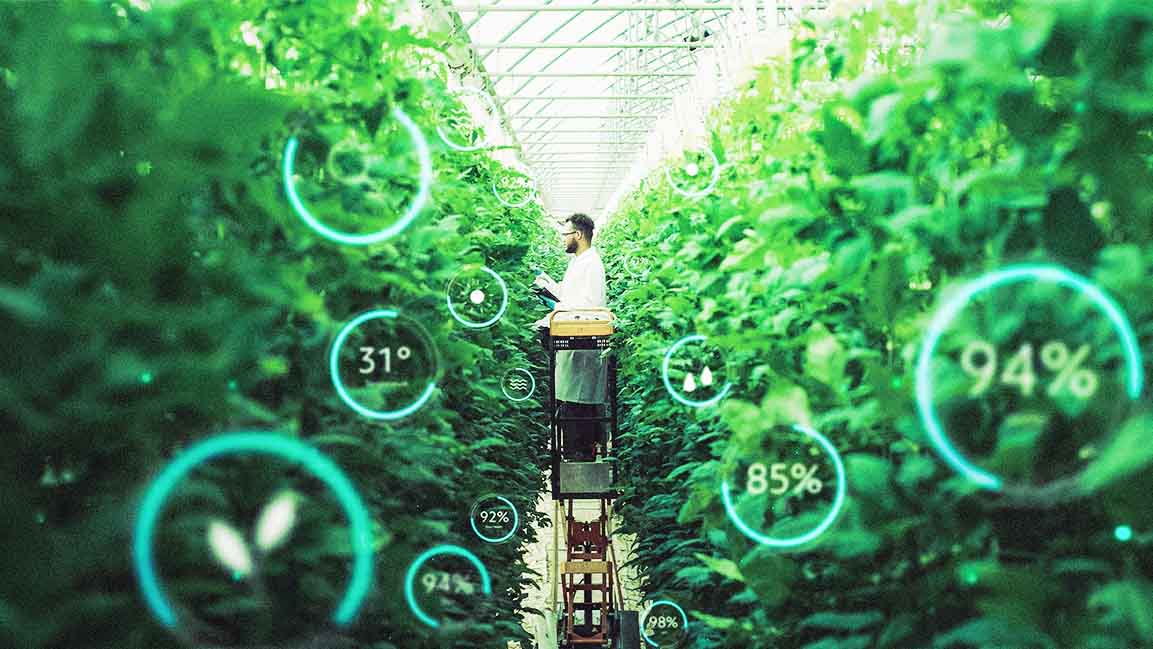- | 9:00 am
From farm to fork: How AI is transforming the food industry in the UAE
AI promises a resilient and responsive food system, and the UAE’s food tech and agritech firms are delivering on this promise

Imagine a world where restaurant menus are created based on guests’ individual preferences, where food waste is virtually eliminated, and where crop diseases are detected before they cause real damage.
Artificial intelligence (AI) continues to drive transformation across the food industry, enabling a new level of automation, productivity, and personalization.
In the UAE, AI is weaving its way into every facet of the local food system, from farms to food services.
Take Egrobots, for example. The Dubai-based agritech startup leverages AI and robotics to detect crop diseases, empowering farmers with insights to enhance agricultural productivity.
“Our AI-powered systems can identify crop diseases much earlier than traditional methods, potentially reducing crop losses by up to 30%. We’re also helping farmers optimize water and fertilizer usage, which is particularly crucial in water-scarce regions like the UAE,” says Akhlad Alabhar, founder and CEO of Egrobots.
These solutions can significantly enhance efficiency and sustainability in a challenging desert environment.
“Our user base is growing rapidly, with increasing interest from UAE farmers. Our technology is trusted by more than 24,000 users in the MENA region,” says Alabhar.
In the not-too-distant future, he expects AI will reshape desert food production in multiple ways, enabling year-round cultivation through smart climate control and resource management and the growth of crops previously unsuitable for arid environments.
AI-driven solutions will also dramatically reduce water usage through predictive analytics and precision irrigation, creating a more resilient and productive agricultural ecosystem.
Such reductions in water usage are already being achieved in Pure Food Technology’s AI-driven, solar-powered hydroponic vertical farm. The UAE-based agri-foodtech startup claims that its 3D-printed farm uses 95% less water than traditional farming and delivers 100 times higher plant-based crop yield.
ASSISTING FOOD SERVICE COMPANIES
AI’s transformative impact on the industry is not limited to how we produce food; it also extends to how we distribute and consume it. For example, AI tools can assist food service companies in obtaining better prices from suppliers, optimizing food stock consumption, and tracking waste.
Dubai-based restaurant operating system provider Jalebi is close to realizing such possibilities with its AI-enabled software-as-a-service.
Currently in pilot testing, the platform is set to transform restaurants’ operations, potentially boosting their profit margins by 20%.
More than 40 restaurant brands currently depend on Jalebi’s operating system to supercharge their business, with about 70% operating in the UAE.
“Supply-chain automation is the critical path to optimizing F&B operational performance. From cost to waste to demand planning and automation, AI will ultimately streamline stock and inventory management towards efficiency, precise forecasting, and improved margins,” says Zohare Haider, co-founder and CEO of Jalebi.
He adds that most food waste occurs in the supply chain, with less than 10% occurring at the restaurant and retail F&B level. As such, tracking consumption data will inform suppliers to improve their sourcing of raw materials. This can positively impact the production of raw materials—whether at factories or farms, where goods are originating.
“A long-tail vision, but one that will only begin when we have sufficient data points consolidating into a unified data lake that educates and enhances the AI’s learning of consumption patterns to then recommend and implement improvements,” says Haider.
That said, while AI-driven automation reduces the need for manual labor in certain tasks and minimizes errors, “the human element of procurement is still crucial to ensure the best products are being sourced,” says Brian Voelzing, founder of UAE-based restaurant consultancy Beluga Hospitality and a seasoned chef and F&B professional.
REVERSE DEMAND PLANNING
Many hotel chains in the UAE now rely on AI tracking systems to reduce food waste. Among them is Jumeirah Zabeel Saray, which achieved a 20-tonne food waste reduction in 2022—the equivalent of 50,000 meals saved—and Hilton, which cut food waste by 62% across 13 UAE properties over four months in 2023.
Haider says AI will reduce food waste even further in the future by supporting “reverse demand planning” in the supply chain.
Traditional demand planning—estimating the demand for food within a given timeframe—is meant to help companies avoid understocking or overstocking. When done accurately, it optimizes inventory levels and reduces the risk of product waste.
Conversely, poor demand forecasting leads to food waste. In fact, inaccurate demand planning is one of the leading causes of food waste across the food supply chain.
“The reverse feedback loop, from fork to farm, is a powerful driver of reverse demand planning, where the data acquired from plating and plated waste can inform the kitchen on reapportioning meals. This can help optimize procurement decisions by reducing wasteful demand planning,” says Haider.
PERSONALIZED MENUS
From a consumer point of view, Voelzing expects AI to change how people eat by curating personalized dietary plans based on their goals and preferences.
“Apps now track macronutrients and calories and even create recipes for users. Additionally, I believe more restaurants will use AI to create menus based on guest preferences,” he says.
While AI-powered menu personalization has yet to take off in UAE restaurants, it won’t be long, given its benefits, including improved guest satisfaction and loyalty and increased revenue.
“AI is valuable for collecting dining preferences and will likely be used in most restaurants to guide chefs in menu development and item selection,” concludes Voelzing.







































